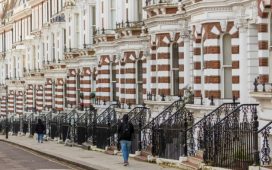Stay informed with free updates
Simply sign up to the UK house prices myFT Digest — delivered directly to your inbox.
House prices in London have underperformed the rest of the UK for the past eight years because of the unaffordable costs of property, post-pandemic housing trends and high mortgage rates.
Official data this week shows that house prices in the capital were 4.8 per cent lower in February 2024 compared with the year before, much worse than the 0.2 per cent contraction registered in the same period across Britain.
The drop left London the worst-performing region in the UK, even as it remained the most expensive part of the country, with a typical property costing £503,000, well above the national average of £281,000.
The divergence between house prices in London and the rest of the country has been recorded in Office for National Statistics data almost uninterruptedly since 2016.
Analysts attributed the trend to the high cost of housing in the capital and the market impact of the pandemic, when many people left big cities.
UK nominal house prices were up 37 per cent in February this year compared with the same month in 2016, but just 10 per cent higher in London, according to a Financial Times analysis of ONS figures.
Robert Gardner, chief economist at lender Nationwide, said that, relative to the national average, London house prices had been “trending lower” since 2016. “The main driver is the fact that affordability just was much more stretched in London,” he added.
Growth in house prices in the capital ran faster than the national average after the 2008-09 financial crisis, hitting double digits in 2014 and most of 2015 — more than double the UK rate.
Experts said the fast and sustained rates of growth had been boosted by strong employment growth and high levels of new business investment.
However by 2016 house prices in the capital were more than 2.2 times higher than the national average, the highest ratio since records began in 1968, official data shows.
Relative to earnings, house prices in London reached the highest on record in 2016, according to separate data from Nationwide.
Tom Bill, head of UK residential research at estate agency Knight Frank, said “an issue of affordability” had been the “primary reason” for London’s underperformance over the past eight years.
In the capital “people have been increasingly squeezed in terms of house prices, with prices out of reach for more and more people and that just naturally slowed down some of the growth . . . after the financial crisis,” he added.
Brexit and mortgage regulatory changes also played a role, according to Richard Donnell, executive director at property consultancy Houseful.
“2016 was a turning-point year — the Brexit vote hit employment growth in London and we started to see lower inward investment on the increased uncertainty,” he said.
Donnell also cited tax changes for landlords and capital gain taxes on property sales by overseas owners introduced in the mid-2010s
The “race for space” after the onset of Covid-19, where buyers with savings targeted bigger homes, has prolonged the underperformance of the capital.
Strong house price growth boosted by record-low interest rates during the pandemic was only tepid in London. Across the UK nominal house prices are 22 per cent above their levels in February 2020, but they are only up 6 per cent in London.
With the Bank of England raising interest rates from 0.1 per cent at the end of 2021 to 5.25 per cent last summer in a bid to tame inflation, “affordability in London has deteriorated more than elsewhere because already valuations were more stretched”, said Gardner.
He added that parts of the country where properties were more affordable had generally performed better. House prices in Wales, Northern Ireland, the North West and the East Midlands have all grown by more than 40 per cent since 2016, ONS data shows.
While growth in rental costs in London is forecast to cool from the record 11.2 per cent registered in the year to March, analysts were split on the outlook for house prices.
Andrew Wishart, economist at research company Capital Economics, said the capital looked more affordable because earnings were outpacing house prices, adding: “I think this sort of London underperformance seen since the mid-2010s is over.”
Bill agreed that prospective buyers would increasingly reconsider properties in the capital as the price differential with the rest of the UK shrank, but cautioned that the return would not “happen quickly”.
“London’s underperformance will continue for the next few years,” he added.














